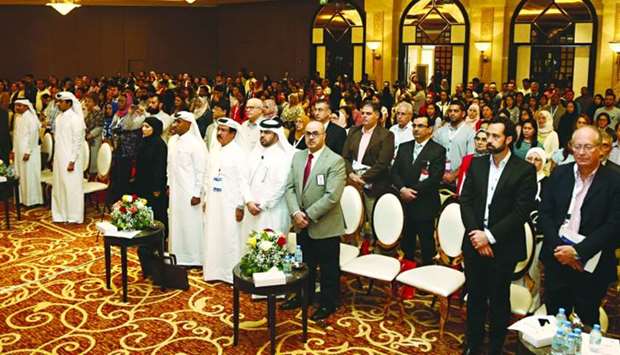Al Ahli Hospital started a two-day symposium on oesophageal disorders on Friday at Ezdan Palace Hotel with the participation of over 600 healthcare professionals. The event will discuss various advancements in the technologies and treatment of oesophageal disorders and will have several talks and presentations by international and local experts.
The symposium was opened by Khalid al-Emadi, CEO, Al Ahli Hospital and Medicare Group, who welcomed the participants and highlighted the importance of the symposium. Dr Abdul Azim Abdul Wahab Hussain, chief of medical staff, told that the symposium had a huge response from the healthcare professionals in the country.
“We had planned for about 500 participants but we had about 700 registrations. However, we had to stop at around 600 due to various reasons and we are sure that the participants will have a great learning experience throughout the conference,” noted Dr Hussain.
“The experts will discuss several oesophageal disorders. Gastroesophageal reflux is becoming very common disorder. Other oesophageal disorders that will be discussed are heartburn, cancer, and eosinophilic oesophagitis. We will also discuss the non-immersive treatment options to cure many of the disorders,” explained Dr Hussian.

Dr Chrisitan Madl speaking at the event
"This is the second such symposium organised by Al Ahli Hospital. The symposium discusses several matters related to gastroesophageal reflux. We have a number of international experts to discuss various aspects of the topic. We will discuss the most recent research in the field as well as the technological advancements,” said Jamal Saleh Hammadi, deputy CEO and director of projects.
The academic part of the symposium started with a presentation by Dr Chrisitan Madl, professor of gastroenterology and head, Department of Internal Medicine, Rudolfstiftung Hospital, Vienna, on the topic, ‘Gerd: Pathophysiology and Epidemiology.’
“Gerd (gastroesophageal reflux disease) is the most common diagnosis in outpatient clinics. In the US, it is estimated that 15 to 20% of adults are affected by Gerd. There is also clear evidence that the disorder is increasing in most developing countries,” noted Dr Madl.
The most common problem with the oesophagus is Gerd, which is caused by a muscle that does not close properly. This allows stomach contents to leak back, or reflux, into the oesophagus and irritate it. Over time, Gerd can cause damage to the oesophagus.


